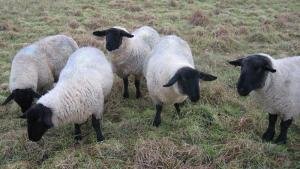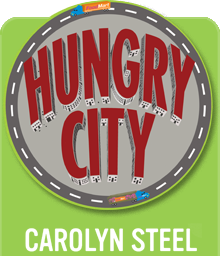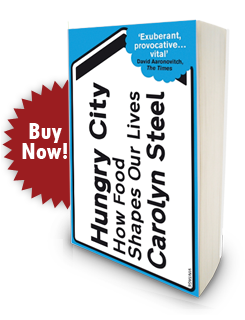Posted by Carolyn on April 27, 2009 at 10:03 pm
I’m not sure if you’re supposed to blog about the future, but anyway – I’m heading off to the USA tomorrow, to take part in a debate on Vertical Farms with Dickson Despommier and Robin Osler at the National Building Museum, Washington DC. It’s part of a year-long programme by the NBM called For the Greener Good. We are also going to be debating live on radio earlier that day on the WAMU’s Kojo Nnamdi show.
I am then off to New York, where I am giving a Masterclass in Sustainable Design for the US Green Building Council of New York at the invitation of Yetsuh Frank, and chairing an event organised by Yetsuh and my dear friend Claire Hartten, called Hungry New York. I am very excited by all of it, and hope to blog about it as it unfolds!
For more info, see here:
For the Greener Good.
US Green Building Council Masterclass in Sustainable Design.
Posted by Carolyn on April 24, 2009 at 1:34 pm
Last night I went to the launch of Julia Wright’s new book, Sustainable Agriculture and Food Security in an Era of Oil Scarcity: Lessons from Cuba. Since the book costs an eye-watering £60.00, I thought I would share with you some of her key findings.
Wright has spent the last 15 years studying the Cuban response to the collapse of the Soviet Union, from which it had previously imported 50 percent of its food. The agricultural revolution that ensued, particularly in organic urban agriculture, has become the stuff of legend – so much so that the WWF described Cuba as the only example of sustainable development in the world.
Wright does not deny that Cuba’s urban farms, or organopónicos, have been a success. However she points out that they only supply 5 percent of the nation’s food, so can hardly be held up as an example of urban farming feeding a nation. More interestingly still, she has found that 75 percent of Cuban farmers use agrochemicals, and 83 percent would apply more if they could. Indeed, Cuban imports of these are increasing steadily, and the nation now imports 80 percent of its food.
In fact it turns out that the Cuban agricultural miracle, if not exactly over, is in the process of turning back into something far more familiar. Despite a wealth of evidence that, according to Wright, shows that organically farmed land was in fact more productive than industrially farmed, the nation is reverting to the latter – with all the associated problems of oil dependency and soil degradation (25 percent of Cuban soil is already degraded).
Despite their extraordinary achievements in response to an unprecedented food crisis, it seems that most Cubans yearn for a food system more akin to that of the West. The conversion to organic self-sufficiency never occurred in their heads.
Posted by Carolyn on April 24, 2009 at 12:02 pm

Did you see that survey last week revealing that one in ten people in Britain can’t identify a sheep? It set me thinking…
The headline-grabbing wad of cash pledged by the recent G20 summit to kick-start the global economy is exacerbating, not solving, a problem. A system of flagrant mismanagement and opacity whose chief engine has been a fantasy lifestyle fuelled by the exploitation of people and resources, whose apparent ‘growth’ in fact turns out to have been a parallel fantasy, has been hauled back off the crash-pile and kick-started in the hope that, this time round, it will run a better race. But history tells us that it won’t. Like the Industrial Revolution before it, the global economy is a machine driven by its own internal logic. Social transformation is its by-product, not its goal.
When cash injections and financial regulation are the only language we can find to discuss what is ultimately a matter of human dwelling, we have a problem. Take living in cities, for example. These days, the notion that mass migration from rural to urban areas is both inevitable and inherently beneficial goes largely unchallenged. The trappings of urban life – a TV, a car, a washing machine – are thought to easily outweigh the disadvantages of rural poverty. What is less commonly admitted is that rural poverty is itself often the consequence of urban migration. In many parts of the world, living in the countryside is no longer an option precisely because the countryside has been transformed in order to feed cities. As for whether urban life is better than rural, why not ask the 26 million Chinese migrant workers who currently find themselves unemployed?
Which is where those sheep come in. How is it possible, in a nation like ours blessed with fertile agricultural land (70 percent covered in it, no less) that one in ten of us can’t recognise a sheep? OK, not everybody eats lamb or wears woolly jumpers any more; the point is that we live totally cut off from nature, from reality. Six hundred years ago, Britain was one of the richest nations on earth thanks to its superior sheep. Our woolly friends may not be the economic force they once were, but they can still mow the grass while fertilising the soil, make us smile as they frolic in the spring, provide us with winter clothes and delicious Sunday lunches.
The global economy is like an electronic trade-wind blowing miles above our heads. It affects us, not because it is directly connected to our lives, but precisely because it isn’t. Sheep, trillions of dollars: take your pick. It’s all about how we live, and what we value.
Posted by Carolyn on April 6, 2009 at 12:12 pm
I am delighted to have been featured in the latest issue of The Ecologist as one of their 21st Century visionaries. For more info on the article, see here.
Posted by Carolyn on April 1, 2009 at 8:49 pm
I am just back from the Hague, where I gave a talk to launch Foodprint, a new programme at Stroom, a gallery dedicated to architecture and the visual arts. For the next two years, Foodprint will explore various aspects of the relationship between food and cities, with a programme of talks, projects, workshops and symposia.
To see a video of part of the Q+A session, click here










